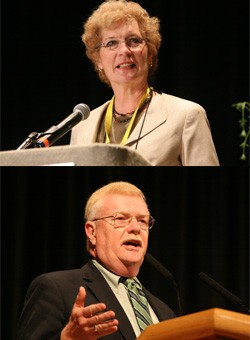The following statement is from Gradye Parsons, Stated Clerk of the General Assembly of the Presbyterian Church (U.S.A.) and Linda Valentine, Executive Director of the General Assembly Mission Council.
Each December Presbyterians join Christians around the world in turning our thoughts to the place of Jesus’ birth — the little town of Bethlehem. When we do, the image is typically of a still, small, sleepy village, which continues on oblivious to the ages. But nothing could be further from the truth. As tourists to Bethlehem know, the “little town” is all but surrounded by the 25-foot concrete wall, built for Israel’s security, but creating significant difficulties for Palestinian residents. While tourists are ordinarily able to pass quickly through the massive check-point that controls the route to nearby Jerusalem, Palestinian residents and those who would visit them often endure long hours of delay and harassment there.
The contradictions between religious hopes for peace and the realities on the ground in the Holy Land are often overlooked. We have strongly advocated for the right of both peoples to live peacefully within mutually recognized, secure borders. We have affirmed Israel’s legitimate concern for the security of its citizens and the Palestinians’ right to self-determination. We have unequivocally condemned all forms of violence.
Given the failure of many attempts at peace negotiations, our church has decided to take an active role in just peacemaking. We have begun a process of corporate engagement with companies whose products are used in the region for non-peaceful purposes. To this point, we have not divested from any company, but rather are using our position as stockholders to further the prospects for peace in the region.
Far from using anti-Semitic or “replacement” theologies to “demonize” or deny Jewish claims to Israel, as alleged in the recent opinion-editorial by Rabbis Martin Heir and Abraham Cooper published in the Wall Street Journal, our approach has been to seek to persuade Jewish friends, neighbors and relatives to support a two state solution that allows Israelis and Palestinians to live in dignity, peace and prosperity.
At our 2010 General Assembly, commissioners reviewed and debated an extensive report on Israel and Palestine within the context of the Middle East. That report included the recognition (confirmed in congressional testimony by General Petraeus) that the continued Israeli occupation of Palestine poses an enduring security threat to other U.S. interests in the region. The General Assembly also commended for study the Palestinian Christians’ Kairos document and endorsed its emphases on hope for liberation, nonviolence, love of enemy, and reconciliation.
The specifics of the Presbyterian report include reaffirmed support for the state of Israel with internationally-recognized borders at peace with all its neighbors. We clearly support an end to the occupation and an overall de-militarization of the Middle East. As followers of the “Prince of Peace,” we cannot support U.S. foreign policy that underwrites the domination of one people by another or the arming of undemocratic regimes of any kinds— nor do we idealize any of the political entities in the Middle East. We believe that all governments should obey international law and should serve the well-being of all those under their power.
Much is stake, as the familiar Christmas carol notes regarding Bethlehem: “the hopes and fears of all the years are met in thee tonight.” The Presbyterian Church (U.S.A.) calls for prayers that hope for peace will cast out fear and lead to better future. The security of Israelis and Palestinians is inextricably linked to a just peace for both peoples.

